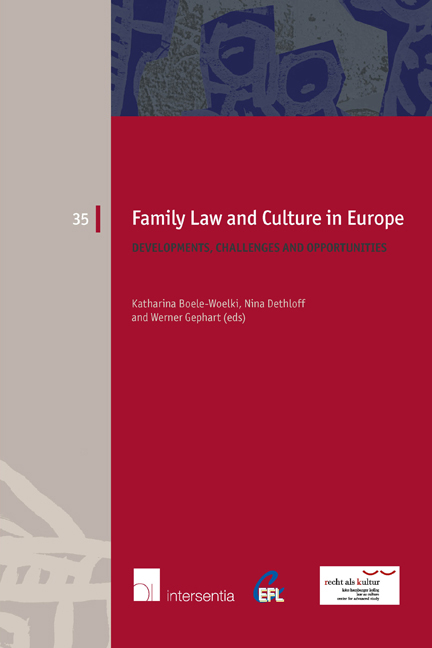Book contents
- Frontmatter
- Preface
- Contents
- List of Authors
- PART ONE THE CEFL PRINCIPLES ON PROPERTY RELATIONS BETWEEN SPOUSES
- PART TWO BREAKUP OF (NON-)FORMALISED RELATIONSHIPS
- PART THREE NEW CONCEPTS OF PARENTAGE
- PART FOUR INTERNATIONAL FAMILY RELATIONSHIPS
- PART FIVE TRANSNATIONAL FAMILIES: ACROSS NATIONS AND CULTURES
- Family Life and EU Citizenship: The Discovery of the Substance of the EU Citizen's Rights and its Genuine Enjoyment
- Private and Family Life versus Morals and Tradition in the Case Law of the ECtHR
- Real-Life International Family Law: Belgian Empirical Research on Cross-Border Family Law
- Transnational Family Relations Involving Moroccan Nationals Living Abroad: An Analysis of the Implementation of the Moroccan Family Code Brief report on research in progress
- Family Law as Culture
- EUROPEAN FAMILY LAW SERIES
Family Law as Culture
from PART FIVE - TRANSNATIONAL FAMILIES: ACROSS NATIONS AND CULTURES
Published online by Cambridge University Press: 22 November 2017
- Frontmatter
- Preface
- Contents
- List of Authors
- PART ONE THE CEFL PRINCIPLES ON PROPERTY RELATIONS BETWEEN SPOUSES
- PART TWO BREAKUP OF (NON-)FORMALISED RELATIONSHIPS
- PART THREE NEW CONCEPTS OF PARENTAGE
- PART FOUR INTERNATIONAL FAMILY RELATIONSHIPS
- PART FIVE TRANSNATIONAL FAMILIES: ACROSS NATIONS AND CULTURES
- Family Life and EU Citizenship: The Discovery of the Substance of the EU Citizen's Rights and its Genuine Enjoyment
- Private and Family Life versus Morals and Tradition in the Case Law of the ECtHR
- Real-Life International Family Law: Belgian Empirical Research on Cross-Border Family Law
- Transnational Family Relations Involving Moroccan Nationals Living Abroad: An Analysis of the Implementation of the Moroccan Family Code Brief report on research in progress
- Family Law as Culture
- EUROPEAN FAMILY LAW SERIES
Summary
INTRODUCTION AND OVERVIEW: WHY FAMILY LAW SHOULD BE LINKED TO THE CULTURAL BASICS OF SOCIETY
The aim of my article is to apply the ‘law as culture perspective’ of the Käte Hamburger Center for Advanced Study in the Humanities named ‘Law as Culture’ to questions of family law. I will start with the fundamental question of why culture should matter at all in family law affairs. I shall do this even though the burden of proof seems like it ought to be the other way around, that is one should have to explain why in matters so deeply related to tradition, religion and the nation as family structures and their regulations, culture should not matter at all (section 2). This is indeed not a completely innocent kind of inquiry because there is or has been at least an important debate about the ‘cultural restraints argument’. To answer this question is of crucial importance for the basic orientation of our centre.
All this presupposes that we are talking about the same subject, that is to say that we are treating family – not its normative regulation but the conception of what ‘family’ means – as identical across different times and different civilisations. A look at family semantics in the world could reveal a wide range of differences.
Next I want to remind you of the importance family law had for the founding fathers, sons, nephews and grandchildren of the discipline I try to stand for: sociology. Especially in Durkheim's writings, the analysis of family law is a privileged methodological tool to grasp by way of the law the structures of family life (section 3).
I then have to mention the difference of law in the books and the living law approach in order to foresee what contemporary debates in European family law may mean for this fundamental distinction. We cannot avoid taking a look at the concept of law used in this context. The more we project culture into the concept of law, by way of including symbolic and ritual elements of the force of law, the easier it becomes to retrace the cultural traits of family law as well, without necessarily calling it a constraint (section 4).
- Type
- Chapter
- Information
- Family Law and Culture in EuropeDevelopments, Challenges and Opportunities, pp. 347 - 360Publisher: IntersentiaPrint publication year: 2014



